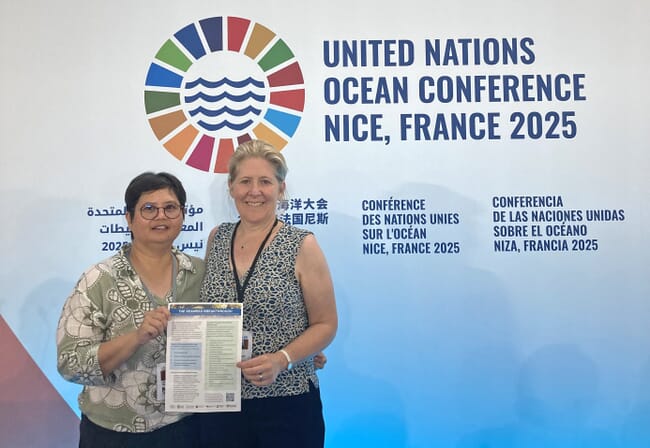
Prof. Lim Phaik Eem of the University of Malaya (left) and Prof. Elizabeth Cottier-Cook of SAMS (right) have been at the UN Ocean Conference to highlight the threat to wild seaweeds © SAMS
The GlobalSeaweed-SUPERSTAR programme will ask, on 13 June, the UN Ocean Conference (UNOC3) in Nice to recognise the importance of seaweed to ocean health and food security and request it be given conservation status similar to coral reefs, mangroves and seagrasses.
The programme, funded by the UK’s Global Centre on Biodiversity for Climate (GCBC), has already published the State of the World’s Seaweed report, which identifies the risks of inaction, and is preparing a Seaweed Breakthrough report to be launched at COP31 next year. It is also backing the call to form a UN Global Seaweed Initiative and is in support of the Nice Ocean Action Plan, which includes promotion of sustainable cultivation practices.
Prof Elizabeth Cottier-Cook of SAMS, who leads the programme, said in a press release: “Seaweeds are remarkable: they can grow over 30 times faster than many terrestrial plants and their long-term carbon burial outranks mangroves and tidal marshes. They absorb excess nutrients to reduce eutrophication, absorb carbon dioxide, increase biodiversity by up to 40%. More than six million farmers in 54 countries culture seaweeds with a global production valued at over USD $ 17 billion in 2024.’’
In its Seaweed Breakthrough, GlobalSeaweed-STAR will call on global, regional and national finance could be mobilised to halt the loss, support the protection and restoration of at least 30% of wild seaweed habitats.
‘’We recognise the importance of wild seaweeds in the growth and contribution of the seaweed sector to food security, trade, environmental sustainability, and livelihoods - particularly in developing countries, Least Developed Countries (LDCs), and Small Island Developing States (SIDS). This can only be realised, however, if seaweeds are given as high a conservation status as coral reefs, mangroves and seagrasses to ensure that their long-term protection is secured and that the livelihoods of the millions of farmers who are dependent on seaweeds is safeguarded,” she adds.
The Seaweed Breakthrough initiative aims to catalyse global action to conserve, restore and sustainably manage seaweed ecosystems. It proposes targets for halting loss, ecosystem protection and restoration, and sustainable finance – all aligned with major global commitments including the Kunming-Montreal Global Biodiversity Framework, the Paris Agreement, and the UN Decades on Ecosystem Restoration and Ocean Science.
GlobalSeaweed-SUPERSTAR is working in partnership with organisations including the Natural History Museum (London), the United Nations University, the University of Malaya and the Global Seaweed Coalition, among others.




